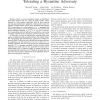242 search results - page 48 / 49 » Randomness in Cryptography |
EUROCRYPT
2004
Springer
13 years 11 months ago
2004
Springer
Informally, an obfuscator O is an efficient, probabilistic “compiler” that transforms a program P into a new program O(P) with the same functionality as P, but such that O(P)...
EUROCRYPT
2003
Springer
13 years 11 months ago
2003
Springer
A new public-key model for resettable zero-knowledge (rZK) protocols, which is an extension and generalization of the upper-bounded public-key (UPK) model introduced by Micali and ...
CRYPTO
2000
Springer
13 years 10 months ago
2000
Springer
In this work we use cryptography to solve a game-theoretic problem which arises naturally in the area of two party strategic games. The standard game-theoretic solution concept for...
ICDCS
2010
IEEE
13 years 9 months ago
2010
IEEE
—There are several analytical results on distributed hash tables (DHTs) that can tolerate Byzantine faults. Unfortunately, in such systems, operations such as data retrieval and ...
EUROCRYPT
2007
Springer
13 years 9 months ago
2007
Springer
We show an efficient secure two-party protocol, based on Yao's construction, which provides security against malicious adversaries. Yao's original protocol is only secur...




